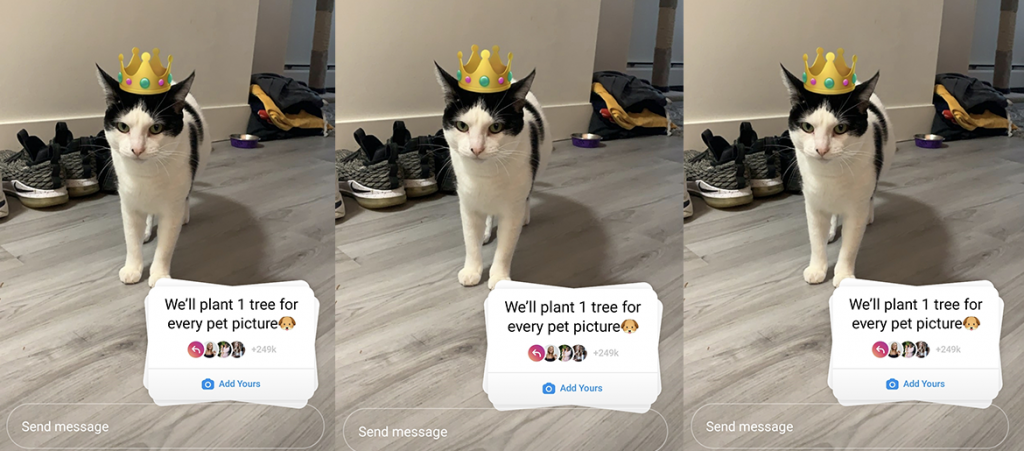
Where were you when you first saw the Plant a Tree Co pets-for-trees sticker on Instagram? Among the shallow media coverage – local and international – about the unusual viral trend, freelance journalist Patrick Marlborough took the time to dig into what was really going on. Here, Marlborough explains what went down and we raise some critical questions that all young Australians should be asking ourselves in the aftermath.
Last week, a rather innocuous sticker was shared on Instagram over four million times. It read: “We’ll plant one tree for every pet picture.” People – perhaps your friends, perhaps yourself – were sharing it on their stories with an accompanying photo of their adorable pets, causing the prompt to go mega-viral. By the end of the day, many people were wondering who exactly was meant to be planting all these trees. I know I did.
Soon, an Instagram page called Plant a Tree Co came forward to claim responsibility. They said it was one big oopsie-daisy, that they did not expect to go viral and quickly got out of control. We can’t plant 4 million trees, but don’t worry we’ve ‘started’ a ‘fundraiser’ to plant as many as possible. Please donate! While the fundraiser is legitimate, it is not theirs – they’ve merely shared a separately fundraiser from Trees For the Future, who are not affiliated with them in any way.
Alarmingly, people’s questions ended there. The mainstream media – from America’s NBC to Australia’s own ABC – reported the story as such, with a wink and eyeroll, directing people to donate to the fundraiser. Few, if any, attempted to dig deeper.
This irked me. It didn’t seem right for the media to amplify a fundraiser without really asking who was behind it, or what it was. The drive to be first in the modern news landscape means journalists are actively encouraged not to pause, take a breath, and dig a little deeper. Instead, the goal is to race to finish a 650-word SEO-friendly article ASAP and pray it gets heaps of clicks, to make more money from ads on site.
Unravelling the full story only required two more clicks on the Plant a Tree Co Instagram profile. Those two clicks led me down a more concerning, three-day rabbit hole into the world of an at-best shady, at-worst scammy Gen Z entrepreneur-bro.
Is Plant a Tree Co a scam?
Here’s the short version: Plant a Tree Co was part of a dropshipping scheme where 20-cent necklaces were sold at a ridiculous mark-up for bulk profit. It all went into the pockets of one 23-year-old computer tech grad in Florida named Zack Saadioui.
Dropshipping is, in the words of Saadioui himself, “essentially selling products you don’t own.” You are the middle-man, selling a dirt-cheap product direct from a factory in China (most commonly) to whatever fool is buying it on the other end. There’s no overheard, just profit. Instagram is riddled with these hustles.
That is how Plant a Tree Co’s business works. Last week, before my investigation blew up, their website claimed “6500 trees planted” and “We’ll plant a tree for every necklace sold.” Despite being listed for $29.95 a lot of the necklaces were for sale at 100% discount – free – plus $9.95 shipping. Bargain, right? Not quite. Almost all of that money is pocketed by Saadioui. It only costs 25-50 cents to plant a tree with most charities, so one necklace should really be resulting in more than a single tree. The ‘shop’ section of the website has since been removed.
Saadioui first started kicking the “6500 trees” number in early 2020 and it remained static ever since. Only after my investigation went viral did he refurbish the website and mission statement, linking to a profile on tree-planting charity, Eden Projects, for the very first time. Except… the profile was only 12-hours old when linked on the site, and had not been verified by the org. Those 6500 trees likely never existed, and if they are now planted it will only be because Saadioui began to feel the heat.
The problem for Saadioui was that the “post your pet” sticker went too viral. Saadioui’s business model works like this: he reverse-searches viral trends, creates a Shopify account selling the relevant viral products, and uses social media accounts to leverage the trend and drive people to the Shopify store. Besides Plant a Tree Co, he also has PetCo, OceanCo and probably more. The reach from the account will send you to a ‘cool’ $29.95 necklace that says “Good Karma”.
Don’t believe me? Saadioui literally spells it out in detailed ‘how to’ videos on his YouTube channel from 2014.
Is this legal?
Is it cynical? Yes. Is it legal? That’s another question. By definition, most people and accounts on Instagram are trying to gain something – attention, clout, profit or all the above. While using the platform to sling shoddy necklaces as part of a passive income stream isn’t illegal, making false claims about charitable donations or initiatives could be. It would depend on the jurisdiction and whether anyone could be bothered to pursue a claim.
What does the pets for trees ruse say about us?
Ultimately, this signifies a larger problem with social media, the shallowness it creates and lack of critical thinking it enables. We wish that simply ‘posting’ was as powerful as direct activism, no matter how many times we are reminded it is not. We want to feel like we are doing something, and Instagram’s sole function is to create that illusion: one of purpose, direction, and community. But an online share – even millions of them – rarely if ever translates to tangible, positive change in the real world.
With that in mind, and with the sticker-saga already a forgotten fad, it might be time to ask ourselves: do we know what we’re doing online?
Critical Thinking Prompts From Zee Feed
We heard from many Instagram followers that they “just” took part in the sticker trend to share a photo of their pet. But, now knowing those “harmless” shares amplified a would-be scam, we’re asking readers to reflect on these questions – if you feel like answering, join us on Instagram, TikTok or send an email to hey@zeefeed.com.au with your thoughts.
- When someone public announces that they intend to do something ‘good’ do you usually believe them? Do you ever follow up to see if it really happened?
- Do you think people benefit from making public promises?
- Is sharing content on social media an endorsement of its validity? If not, why do we share?
- What is the media’s role in reporting on public promise – do you expect them to verify, or simply report announcements?
- How do you answers on the above apply to election promises? Federal Budget promises? What is your expectation on follow-through after voting?




